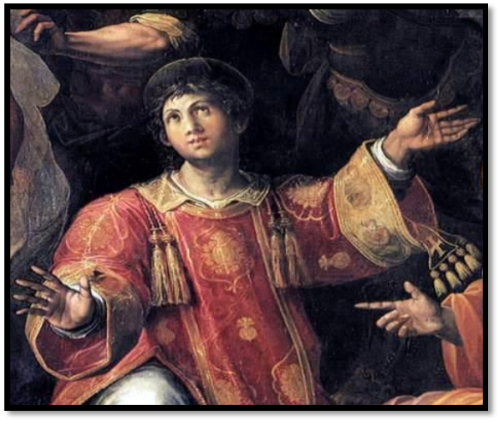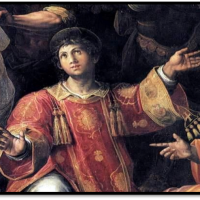I hope that by now, the cycle of Pure Church, Powerful Church, Growing Church, and Persecuted Church is quite apparent. Last week, we saw the Church survive a possible split or being thrown off task into tackling endless divisions and disputes, temptations to overlook some and overwork others, and a bit of temptation to cultivate some leadership pride. Small sins, little bits of nothing, one might think, but in the words of the C.S. Lewis character the senior demon Screwtape, in writing to his apprentice and nephew Wormwood about how to keep Christians from the devil’s “Enemy” (God):
“Nothing is very strong: strong enough to steal away a man’s best years not in sweet sins but in a dreary flickering of the mind over it knows not what and knows not why, in the gratification of curiosities so feeble that the man is only half aware of them,…You will say that these are very small sins; and doubtless, like all young tempters, you are anxious to be able to report spectacular wickedness. But do remember, the only thing that matters is the extent to which you separate the man from the Enemy. It does not matter how small the sins are provided that their cumulative effect is to edge the man away from the Light and out into the Nothing. Murder is no better than cards if cards can do the trick. Indeed the safest road to Hell is the gradual one—the gentle slope, soft underfoot, without sudden turnings, without milestones, without signposts”
Distract the Christian into not being a Christian but just a complacent consumer, is the idea.
The leaders in our early Church would have none of that! They found a prompt solution, and the Church survived. Even some of the priests took notice and began to believe among a large number of other people!
Especially because of the witness of Stephen who our Bibles recount as the first martyr of the Church. We meet him today in Acts 6:8 and following.
 Our author of Acts, the Gospel-writer Luke, devotes more than 1 ½ chapters out of 28 to Stephen. For some perspective, in Luke’s Gospel, 1 ½ chapters out of 24 was Jesus’ sentencing, Crucifixion, death, burial, and Resurrection. So in terms of verbal real estate, Luke gives a lot to Stephen. Why? Well, he was not only the first martyr of the Church, but he is also a hinge on which the Gospel takes a sharp turn, away from just an outflow and fulfillment of Judaism, but transcends it and extends it to the entire Gentile world. This critical moment was important to Luke and forms a transition as the Church moves from Jerusalem and Judea to Samaria and to the very ends of the earth.
Our author of Acts, the Gospel-writer Luke, devotes more than 1 ½ chapters out of 28 to Stephen. For some perspective, in Luke’s Gospel, 1 ½ chapters out of 24 was Jesus’ sentencing, Crucifixion, death, burial, and Resurrection. So in terms of verbal real estate, Luke gives a lot to Stephen. Why? Well, he was not only the first martyr of the Church, but he is also a hinge on which the Gospel takes a sharp turn, away from just an outflow and fulfillment of Judaism, but transcends it and extends it to the entire Gentile world. This critical moment was important to Luke and forms a transition as the Church moves from Jerusalem and Judea to Samaria and to the very ends of the earth.
So what do we know about Stephen? Not much about his birth, etc. but we do know a lot about his character and his knowledge of the Scriptures. Let’s look at Stephen, chosen to be one of the Seven to wait tables from last week:
Acts 6:8 Now Stephen, a man full of God’s grace and power, did great wonders and miraculous signs among the people.
Stephen had character. He walked in the grace and power of God. He even performed signs among the people. So what do you think happened next? Pure Church, Powerful Church, Growing Church…yup, Persecution.
Acts 6:9 Opposition arose, however, from members of the Synagogue of the Freedmen (as it was called)—Jews of Cyrene and Alexandria as well as the provinces of Cilicia and Asia. These men began to argue with Stephen, 10 but they could not stand up against his wisdom or the Spirit by whom he spoke.
Stephen was a competent evangelist and apologist for the Christian faith. You see, Stephen was a Jew completed in Christ. He understood the Jewish history and mindset, but he had something extra: the Spirit of God who gave him words to say. That is why arguments failed against Stephen’s wisdom. The opposition wasn’t opposing Stephen in reality, they were opposing God…just as Gamaliel had talked about a few weeks back. And going against God is always a losing proposition.
If you can’t beat’em, join‘em is one approach that some of the priests took last week.
Another approach is if you can’t beat’em honestly, beat’em by lying about them. Our present culture is good at that one. Lies are everywhere, especially about people who hold to Christian values. So, since these men in our passage couldn’t win the argument fairly, they’d introduce a little lie or two to undermine Stephen.
Acts 6:11 Then they secretly persuaded some men to say, “We have heard Stephen speak words of blasphemy against Moses and against God.”
Rewind: Stephen was chosen as a man full of the Spirit and wisdom (v 3) a man full of faith and of the Holy Spirit (v 5). He was a man full of God’s grace and power, doing great wonders and miraculous signs (v 8). He was a man with wisdom and whose arguments were flawless (v 10). Why would such a man blaspheme? But they tried it with Jesus, so they’ll try the same technique with His followers.
Acts 6:12 So they stirred up the people and the elders and the teachers of the law. They seized Stephen and brought him before the Sanhedrin.
Doesn’t this sound a lot like Jesus’ meeting before Herod and the high priest Caiaphas before His Crucifixion? Only the ruling wouldn’t be crucify because in the Judean province, they only had power to stone to death, and even that, only for blasphemy (speaking against God, against the Law, and against the temple). Any crime other than word or deed against the sanctity of the temple required the criminal to appear before the Roman governor, like Pontius Pilate.
So the false witnesses knew exactly what to say:
Acts 6:13 They produced false witnesses, who testified, “This fellow never stops speaking against this holy place and against the law. 14 For we have heard him say that this Jesus of Nazareth will destroy this place and change the customs Moses handed down to us.”
That ought to do it, the witnesses and the Sanhedrin must have thought! Word and deed against the temple, and against the Law and customs of Moses. But there was one problem: what about Stephen and what about who he was?
 Acts 6:15 All who were sitting in the Sanhedrin looked intently at Stephen, and they saw that his face was like the face of an angel.
Acts 6:15 All who were sitting in the Sanhedrin looked intently at Stephen, and they saw that his face was like the face of an angel.
I wonder sometimes about what his face looked like. When you think of an angelic face, what do you think of? People, in general, I’m guessing might view a face of an angel as sweet and cherubic, like on a Valentine or something. Pretty. Peaceful. Sweet like a child.
I’m not sure Stephen was like that at all. When I think of angels, I think of powerful beings so pure that their countenance, their faces, glow in awesome power and beauty. It’s frightening to behold. That’s why when people see angels, they fall like dead men, they fall down to worship them, and they are greatly afraid. Like how Mary was, or the shepherds in the fields, or John in the book of Revelation. You don’t mess with angels.
Stephen’s face maybe glowed a lot like Moses’ did in our OT reading from this morning. He radiated the power of God. The Sanhedrin looked intently at that.
So what’s going to happen to Stephen? Well, tune in next week for part 1 of his great speech because far from sweet, peaceful, and Valentines-y, what about Stephen? He was a powerful apologist for Christianity. He knew his Bible. He knew Judaism inside and out. He knew the Law. He knew about Moses. And more than anything, he knew the power of a changed life, sold out for Christ. He’s going to give the Sanhedrin a defense of Messianic fulfillment in Jesus like they didn’t even see from Christ who was silent as a lamb before shearers. Stephen will give them rock solid Christianity straight to the heart.
So that’s what about Stephen. What about you and me?
Well, there are a few take home lessons:
- Character matters.
- We’re living in a day and age in which a person’s character is often paper-thin and culture says that’s A-ok. Well, it’s not. My character matters. Your character matters. We need to be people of integrity.
- There once was a man who wanted to bring something precious into heaven, so St. Peter at the TSA booth in heaven checked it out with God. Finally he said, “You’re right. You are allowed one carry-on bag, but I’m supposed to check its contents before letting it through.” But when St. Peter opened the suitcase to inspect the worldly items that the man found too precious to leave behind, all he saw were gold bars and St. Peter looked confused, exclaiming, “I don’t get it. You brought pavement?”
- Gold, silver, an office, a title on a business card. These things won’t last. We need to know what truly matters and pavement isn’t it. When we are godly people, the world can insult us, persecute us, and even kill us, but they can’t take our integrity which is one of 2 things we can bring with us to heaven. We bring our character and other people by our sharing the Gospel and their having faith in Christ.
- Make your character so precious that you’re not ashamed to present before the Lord.
- Second take home lesson is inevitable opposition.
- You see, if our integrity matters, there will be people out there who will try to strip it from us. They may falsely accuse us like they did to Stephen. They may lie about us, gossip about us, and worse, tempt us to give it up out of peer pressure.
- Culture is against godliness. It screams at us, “You idiot. You’re giving up all these pleasures for what? Life’s short. Eat dessert first.” But as the saying goes, sin will always make you go farther than you want to go, want to stay longer than you want to stay, and cost you more than you want to pay. Sin is deceptive in its allure and our culture loves its sin. Hollywood and our newspapers thrive off it.
- God doesn’t, so hold onto your integrity and your character even under the inevitability of opposition and the ridicule the world throws against us.
- Third take home lesson is to know your Bible.
- Christianity cannot be a simple veneer over a worldly life. Because when opposition comes, we need for it to scratch us and still find Christianity there. We need to be solid wood, not a veneer, in a sense. Dig deeper and deeper into us and you know what you’ll find? Rock solid Christian. Not filled with air like those hollow bunnies at Easter that crumble when pressed.
- There are few things the world cannot stand more than a Christian who speaks with grace and power and will not be shaken. We get that confidence from knowing our Scriptures. That’s what Stephen did.
- And finally, being full of both grace and wisdom is a lovely balance. The world can’t stand that.
- Great minds discuss ideas; Average minds discuss events; Small minds discuss people. Even smaller people beat up on people discussing ideas.
- The culture wants to beat up on Christians they see as idiots—especially those who believe in Creation and God–and the culture will take advantage of error when Christians, whether out of naiveté or carelessness, say stupid stuff in the press. The world will pounce on hypocrisy, poor wording and ignorant thought. Then proceed to rip even nice people to shreds by publicizing it. Embarrassing actions become the definition of Christian hypocrisy as if that’s the only flavor hypocrisy comes in. Embarrassing statements get attributed to every Christian, even using the f-word: fundamentalist. For small minds, talking heads, and vapid reporters, controversial statements somehow require comment from every Christian. But I am not Todd Akin. I am not Jim or even Tammy Fae Bakker. I am not Ted Haggard. I had nothing to do with anything Rudy Giuliani did or did not say. I am not responsible for what any other Christian says. Unless those words are quotes coming straight out of my Bible in which case, yes, I’ll own those. Being nice alone doesn’t cut it. Grace and wisdom belong together.
- We must also check our behavior. As Christians, we cannot get in the ditch with our adversaries for angry hand to hand combat. We cannot go out with both barrels blazing to attack non-Christians or rip other people to shreds in the newspapers or on TV. We are gracious truth seekers armed with a Bible as our only offensive weapon. The rest of the time we just stand firm and let our angel-faces do the talking in Spirit-given words. Our actions and God’s Word will speak loud enough. So, let’s have both grace and wisdom.
That’s what we’ll see with Stephen, the first martyr of the Church. His speech is a primer on how to deal with opposition and how to be a gracious yet powerful Christian radical. Next week we’ll look at his speech in detail to learn how to stand for something truly important, something truly earth changing, and something absolutely radical in an unassailable way. Character matters, opposition happens, and we must know our Bibles because Grace and Wisdom go together. That’s what we learn when we look at Stephen and live lives that—like his–honor God.
 The audio link to the message “What About Stephen?” on Acts 6:8-15 can be found at
The audio link to the message “What About Stephen?” on Acts 6:8-15 can be found at  Persecution and pressure from outside strengthen, build, and purify the Church. Problems within the church divide us.
Persecution and pressure from outside strengthen, build, and purify the Church. Problems within the church divide us.
 The Twelve were smart because they didn’t build a banyan tree ministry. They had the other type, a banana tree ministry in which a mother plant sends out daughters and they send out daughters. The mother plant may eventually die, but having sent new growth out in strength, the movement becomes bigger, stronger, and more diverse. Why? Because each daughter sends out daughters of their own in health and strength to minister to the local surroundings.
The Twelve were smart because they didn’t build a banyan tree ministry. They had the other type, a banana tree ministry in which a mother plant sends out daughters and they send out daughters. The mother plant may eventually die, but having sent new growth out in strength, the movement becomes bigger, stronger, and more diverse. Why? Because each daughter sends out daughters of their own in health and strength to minister to the local surroundings. So the ministry of the Word was important and the ministry of practical application was important too. Not a case of spiritual elitism, of the notion that doing spiritual stuff is better, but only that delegation to each’s gifts and strengths is godly. Furthermore, by giving the group a say in the matter, they each felt like they had a part in creating a solution. Involving the whole group in tackling the problem makes it more likely they’ll want to be part of the solution instead of resisting it and dwelling in the division. Which if you’ve ever put a wedge on the end of a log and applied pressure you know it splits. Same thing happens in a church if the wedge is not removed. These widows were just an important symptom of a wedge being present and the Twelve quickly recognized disunity–the true wedge– as the problem and moved to a wise solution.
So the ministry of the Word was important and the ministry of practical application was important too. Not a case of spiritual elitism, of the notion that doing spiritual stuff is better, but only that delegation to each’s gifts and strengths is godly. Furthermore, by giving the group a say in the matter, they each felt like they had a part in creating a solution. Involving the whole group in tackling the problem makes it more likely they’ll want to be part of the solution instead of resisting it and dwelling in the division. Which if you’ve ever put a wedge on the end of a log and applied pressure you know it splits. Same thing happens in a church if the wedge is not removed. These widows were just an important symptom of a wedge being present and the Twelve quickly recognized disunity–the true wedge– as the problem and moved to a wise solution. Coping with Divisions in the Church (a message on Acts 6:1-7) was first preached at Plymouth Congregational Church of Racine, WI on February 22, 2015 by Barbara Shafer.
Coping with Divisions in the Church (a message on Acts 6:1-7) was first preached at Plymouth Congregational Church of Racine, WI on February 22, 2015 by Barbara Shafer.



 We see here a chain of command, just like in A Few Good Men. Jesus tells Pilate that he has no power other than that given by God and therefore, the worse crime was done by those who handed Jesus over. The religious leaders tried to wash the blood from their hands, figuratively speaking. They tried to forget that this is what they had done! And then here come these apostles. Teaching about Jesus. It’s like He never died! It’s like He’s back! It didn’t stop with His death, it only scattered the teaching authority over a wider group of disciples who find their courage in obeying God’s orders. The ones Jesus gave them to take the Gospel to the very ends of the earth.
We see here a chain of command, just like in A Few Good Men. Jesus tells Pilate that he has no power other than that given by God and therefore, the worse crime was done by those who handed Jesus over. The religious leaders tried to wash the blood from their hands, figuratively speaking. They tried to forget that this is what they had done! And then here come these apostles. Teaching about Jesus. It’s like He never died! It’s like He’s back! It didn’t stop with His death, it only scattered the teaching authority over a wider group of disciples who find their courage in obeying God’s orders. The ones Jesus gave them to take the Gospel to the very ends of the earth. Here is the distinction between civil disobedience and criminal activity: civil disobedience involves disobeying authority without violence to do what was never morally wrong in the first place.
Here is the distinction between civil disobedience and criminal activity: civil disobedience involves disobeying authority without violence to do what was never morally wrong in the first place.